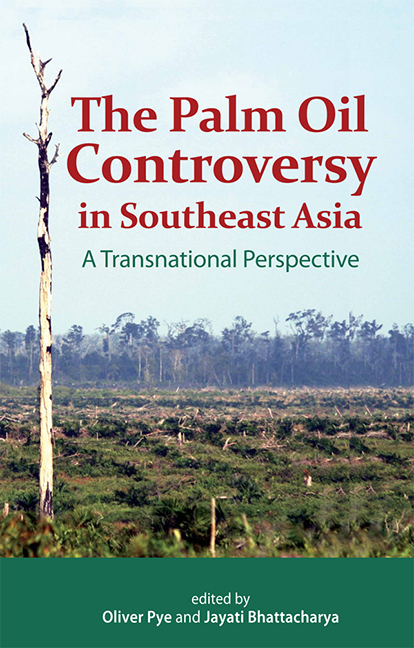Book contents
- Frontmatter
- Contents
- Foreword
- Preface
- Contributors
- Abbreviations
- 1 Introduction
- 2 Malaysian Corporations as Strategic Players in Southeast Asia's Palm Oil Industry
- 3 The Political Ecology of the Indonesian Palm Oil Industry
- 4 Evolutionary Change in the Oil Palm Plantation Sector in Riau province, Sumatra
- 5 Contradictions of Palm Oil Promotion in the Philippines
- 6 The Political Economy of Migration and Flexible Labour Regimes: The Case of the Oil Palm Industry in Malaysia
- 7 Migration and Moral Panic: The Case of Oil Palm in Sabah, East Malaysia
- 8 Reconciling Development, Conservation, and Social Justice in West Kalimantan
- 9 An Analysis of Transnational Environmental Campaigning around Palm Oil
- 10 EU Biofuel Policies and their Implications for Southeast Asia
- 11 Leveraging Product and Capital Flows to Promote Sustainability in the Palm Oil Industry
- 12 Free, Prior, and Informed Consent? Indigenous Peoples and the Palm Oil Boom in Indonesia
- Index
- Plate section
6 - The Political Economy of Migration and Flexible Labour Regimes: The Case of the Oil Palm Industry in Malaysia
Published online by Cambridge University Press: 21 October 2015
- Frontmatter
- Contents
- Foreword
- Preface
- Contributors
- Abbreviations
- 1 Introduction
- 2 Malaysian Corporations as Strategic Players in Southeast Asia's Palm Oil Industry
- 3 The Political Ecology of the Indonesian Palm Oil Industry
- 4 Evolutionary Change in the Oil Palm Plantation Sector in Riau province, Sumatra
- 5 Contradictions of Palm Oil Promotion in the Philippines
- 6 The Political Economy of Migration and Flexible Labour Regimes: The Case of the Oil Palm Industry in Malaysia
- 7 Migration and Moral Panic: The Case of Oil Palm in Sabah, East Malaysia
- 8 Reconciling Development, Conservation, and Social Justice in West Kalimantan
- 9 An Analysis of Transnational Environmental Campaigning around Palm Oil
- 10 EU Biofuel Policies and their Implications for Southeast Asia
- 11 Leveraging Product and Capital Flows to Promote Sustainability in the Palm Oil Industry
- 12 Free, Prior, and Informed Consent? Indigenous Peoples and the Palm Oil Boom in Indonesia
- Index
- Plate section
Summary
This chapter examines the significance of migrant labour in the context of the flexible labour regimes of late capitalism with respect to the oil palm plantation economy of Malaysia. It begins with a section on the political economy of plantation labour in Malaysia, beginning with the colonial economy under the British and its transformation in the 1970s and 1980s, including the switch from rubber to oil palm as the main commodity in plantation agriculture. Colonial plantation labour which was predominantly Indian morphed into a dependence on migrant labour which was mostly Indonesian in the 1990s onwards. A flexible labour regime replaced that of the more rigid structure of the colonial economy in the post-independence period under the aegis of local Malaysian, often state-sponsored, capital. Globalization has accelerated the emplacement of this flexible labour regime in the Malaysian political economy which ensures high returns to capital in the epoch of late capitalism. It is evident that the development of the oil palm industry with its plantations and ancillary downstream industries has been dovetailed with the newly industrializing economy of Malaysia. After examining the evolution of the plantation economy, the chapter in the latter part touches on the social and political ramifications of the migration of foreign labour into the oil palm industry. Paradoxically, the plantation economy today mirrors that of its colonial predecessor in that the articulation of flexible migrant labour in today's plantation economy is equally marked by the extraction of surplus and in conditions far from satisfactory from a human rights perspective. To put it plainly, migrant plantation workers come under a labour regime which exhibits a modernized form of surveillance, control, and suppression.
PLANTATION LABOUR IN THE COLONIAL ECONOMY
The Malayan (later Malaysian) plantation economy was originally based mainly on the growing of rubber. The rubber plant (Hevea brasiliensis) found its way to Malaya via the Kew Gardens through the British colonial economy. Although not an instant success, by about the turn of the twentieth century, rubber hectarage grew spectacularly, from about 68,800 hectares in 1908 to 121,400 hectares in 1910 and by 1918, over 526,000 hectares.
- Type
- Chapter
- Information
- The Palm Oil Controversy in Southeast AsiaA Transnational Perspective, pp. 120 - 139Publisher: ISEAS–Yusof Ishak InstitutePrint publication year: 2012



